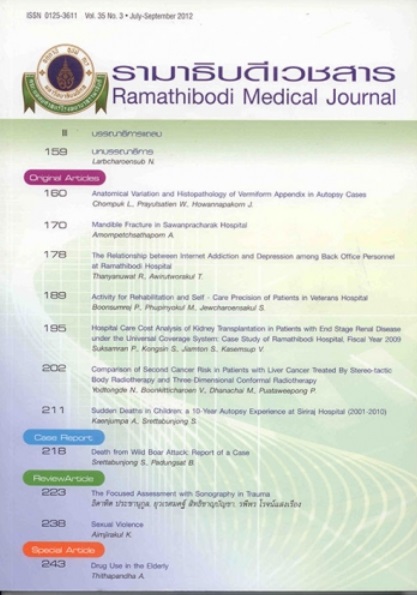The Relationship between Internet Addiction and Depression among Back Office Personnel at Ramathibodi Hospital
Keywords:
Internet addiction, DepressionAbstract
Objective: This study aimed to assess the association between internet addiction and depression. We also studied the epidemiology of the people who are addicted to the internet and working as back office personnel at Ramathibodi Hospital
Method: With the cross-sectional study, the data was gathered from 891 back officer personnel in various departments of Ramathibodi Hospital in 2011. The questionnaire consists of four parts i.e. demographic data, characteristic pattern of internet use, Young’s Internet Addiction Test (IAT), and screening test for depression CES-D (Center for Epidemiologic Studies-Depression Scale). Binary logistic Regression was used to assess the association between the internet addiction and depression.
Finding: Results showed that the people addicted to the internet mainly are young (aged between 18 - 30), single or separated, and with the internet use over 6 hours each time or 16 hours per week. The internet is used for chat and information search. It is also found that degree of addiction and gender are associated with the depression. The people who are addicted to the internet are prone to depression with a greater tendency in females.
Conclusion: Internet addiction is related to depression. Further studies are need to determine the causes and their consequences.
References
Ha JH, Kim SY, Bae SC, Bae S, Kim H, Sim M, et al. Depression and internet addiction in adolescents. Psychopathology. 2007;40(6):424-30.
Phapoom P. Computer/ internet addiction: prevention and intervention. Journal of Mental Health of Thailand. 2003;11(1):41-54.
Kim K, Ryu E, Chon MY, Yeun EJ, Choi SY, Seo JS, et al. Internet addiction in Korean adolescents and its relation to depression and suicidal ideation: a questionnaire survey. Int J Nurs Stud. 2006;43(2):185-92. doi:10.1016/j.ijnurstu.2005.02.005.
Lo SK, Wang CC, Fang W. Physical interpersonal relationships and social anxiety among online game players. Cyberpsychol Behav. 2005;8(1):15-20. doi:10.1089/cpb.2005.8.15.
Whang LS, Lee S, Chang G. Internet over-users' psychological profiles: a behavior sampling analysis on internet addiction. Cyberpsychol Behav. 2003;6(2):143-50. doi:10.1089/109493103321640338.
Young, KS. Internet Addiction: Symptoms, Evaluation, and Treatment. Innovations in clinical practice: A source book. 1999;17:19-31.
Liu TC, Desai RA, Krishnan-Sarin S, Cavallo DA, Potenza MN. Problematic Internet use and health in adolescents: data from a high school survey in Connecticut. J Clin Psychiatry. 2011;72(6):836-45. doi:10.4088/JCP.10m06057.
Yen CF, Yen JY, Ko CH. Internet addiction: ongoing research in Asia. World Psychiatry. 2010;9(2):97.
Young KS, Rogers RC. The Relationship between depression and internet addiction. CyberPsychology & Behavior. 1998;1(1):25-28. doi:10.1089/cpb.1998.1.25.
Morrison CM, Gore H. The relationship between excessive Internet use and depression: a questionnaire-based study of 1,319 young people and adults. Psychopathology. 2010;43(2):121-6. doi:10.1159/000277001.
Greenfield DN. The Nature of Internet Addiction: Psychological Factors in Compulsive Internet Use. Paper Presentation at 1999 American Psychological Association Convention. Boston: Massachusetts; 1999.
Anderson KJ. Internet use among college students: an exploratory study. J Am Coll Health. 2001;50(1):21-6. doi:10.1080/07448480109595707.
Young KS. Caught in the Net: How to Recognize the Signs of Internet Addiction. New York, NY: John Wiley & Sons; 1998.
Trangkasombat U, Larpboonsarp V, Havanond P. CES-D as a screen for depression in adolescents. J Psychiatr Assoc Thailand 1997;42:2-13.
Lee MS, Oh EY, Cho SM, Hong MJ, Moon JS. An assessment of adolescent internet addiction problems related to depression, social anxiety and peer relationship. J Korean Neuropsychiatr Assoc. 2001;40:616-26. doi:10.5124/jkma.1997.40.5.616.
Chou C, Hsiao MC. Internet Addiction, Usage, Gratification, and Pleasure Experience: The Taiwan College Students' Case. Computers & Education. 2000;35:65-80. doi:10.1016/S0360-1315(00)00019-1.
Greenberg JL, Lewis SE, Dodd DK. Overlapping addictions and self-esteem among college men and women. Addict Behav. 1999;24(4):565-71. doi:10.1016/S0306-4603(98)00080-X.
Boneva B, Kraut R, Frohlich D. Using e-mail for personal relationships: the difference gender makes. Am Behav Sci. 2009;45(3):530-49.
Ko CH, Yen JY, Chen CC, Chen SH, Yen CF. Gender differences and related factors affecting online gaming addiction among Taiwanese adolescents. J Nerv Ment Dis. 2005;193(4):273-7. doi:10.1097/01.nmd.0000158373.85150.57.
Yang CK. Sociopsychiatric characteristics of adolescents who use computers to excess. Acta Psychiatr Scand. 2001;104(3):217-22. doi:10.1034/j.1600-0447.2001.00197.x.
Kiesler S, Siegel J, McGuire TW. Social psychological aspects of computer-mediated communication. Am Psychol. 1984;39(10):1123-1134. doi:10.1037/0003-066X.39.10.1123.
Kraut R, Patterson M, Lundmark V, Kiesler S, Mukopadhyay T, Scherlis W. Internet paradox. A social technology that reduces social involvement and psychological well-being? Am Psychol. 1998 ;53(9):1017-31. doi:10.1037/0003-066X.53.9.1017.













